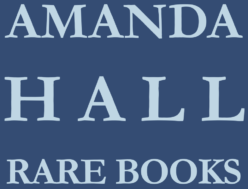Thoughts on Civil Liberty, on Licentiousness, and Faction. By the Author of Essays on the Characteristics, &c. Newcastle, White, 1765.
[bound after:] ibid -
The History of the Rise and Progress of Poetry, through its several Species. Written by Dr. Brown. Newcastle: Printed by T. White and T. Saint, for L. Davis and C. Reymers, against Gray’s-Inn-Gate, Holborn, London. 1764.
First Edition; Second Edition. Two works in one volume, 8vo, (203 x 115mm), pp. History: vii, [i], [9]-266, [2] advertisements; Thoughts: 167, [1],
in contemporary speckled calf, foot of spine chipped, some light surface wear to spine and extremities, red morocco label lettered in gilt.
First edition of John Brown’s wide-ranging discussion of civil liberty, which includes comparisons of Great Britain with Sparta, Athens and Rome. Brown’s remarks on education in this work provoked an attack from Joseph Priestley in An essay on a course of liberal education for civil and active life. With plans of lectures on I. The Study of History and general Policy. II. The History of England. III. The Constitution and Laws of England. To which are added, remarks on a code of education, proposed by Dr. Brown, in a late treatise, intitled, Thoughts on Civil Liberty, London 1765.
The other work in the volume is Brown’s critical analysis of the development of poetry. Starting with a discussion of melody, dance and poetry ‘in the savage state’, Brown goes on to explore the origins of Hebrew, Indian, Chinese and Peruvian poetry and discusses at some length the development of various kinds of poetry in ancient Greece as well as in other European countries. This is a simplified edition under a new title of A dissertation on the rise, union, and power, the progressions, separations, and corruptions, of poetry and music, London 1763, with the section on music omitted. An advertisement leaf after the title informs the reader: ‘It is thought proper to inform the Purchasers of the ‘Dissertation on the Rise, Union, &c. of Poetry and Music,’ that the Substance of this Volume is contained in That; which is now thrown into the present Form, for the Sake of such classical Readers as are not particularly conversant with Music’.
Thoughts: ESTC t789.
History: ESTC t101765.
